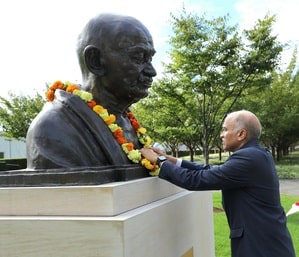Overwhelmed by intractable conflicts, the world organisation observed Mahatma Gandhi’s birth anniversary as the International Day of Nonviolence, looking for glimmers of hope in the leader’s vision.
Secretary-General Antonio Guterres said that “from Ukraine to Sudan, the Middle East, and far beyond, war is creating a hellscape of destruction, destitution, and fear.”
Against this is the power of non-violence, he said.
“Gandhi believed non-violence was the greatest force available to humanity – more powerful than any weapon,” Secretary-General Antonio Guterres said in a message.“Together, let's build institutions to support that noble vision.”
General Assembly President Philomen Yang said: “As the world endures a turbulent period, with conflicts raging in Gaza, Lebanon, Myanmar, Sudan, Ukraine, and elsewhere, the Mahatma’s message of peace resonates more strongly than ever.”
Gandhi's idea of satyagraha influenced Nelson Mandela in South Africa and Martin Luther King Jr in the US. They were deeply influenced by Gandhi’s concept of Satyagraha “which teaches that truth and justice are not achieved through violence but through moral courage and peaceful dialogue,” Yang said in the message delivered by his chef de cabinet Ivor Fung at a meeting on Gandhian Values and UN Charter.
India’s Permanent Representative P. Harish said: “The story of India reflects Mahatma Gandhi's belief that strength comes from righteousness, not force, that power comes from truth not might, and that victory comes from moral courage, not imposed submission.”
“Today's commemoration helps us in reflecting on the life of Gandhiji and reaffirming the universal relevance of the principle of non-violence,” he said.
Sri Lanka’s Permanent Representative Mohan Pieris found parallels between Gandhi’s principles and the UN Charter, aligning them with its Articles.
Article 1 of the UN Charter on the importance of maintaining international peace and security through peaceful means mirrors Gandhi's advocacy for non-violent resolution of conflicts, the concept of Satyagraha, he said.
Gandhi's concept of Sarvodaya, the upliftment of all, is reflected in the Preamble and in Article 55 that emphasise economic and social development, for all nations, reflecting on the ideas of inclusivity and universal welfare.
Jamaica’s Permanent Representative Brian Christopher Manley Wallace said that Gandhi’s “commitment to the protection of the inherent dignity and equality of all human beings, championing the rights of the marginalised and oppressed, and emphasising that every individual deserves freedom and respect” are “the foundation of the Human Rights pillar of the United Nations, and are reflected in the Universal Declaration of Human Rights.”
Vietnam’s Permanent Representative Hoang Giang Dang said that Gandhi’s principle of the right to self-determination for all peoples and his ideas of truth and freedom inspired the anti-colonial movement in many countries in Asia and Africa, “including the freedom struggle in Vietnam led by our great founding father, President Ho Chi Minh.
“While India and Vietnam took different paths to freedom, both the Mahatma and President Ho Chi Minh shared a strong sense of national independence and the common struggle for liberation,” he said referring to his country's revolutionary wars against France and the US.
Vatican’s Permanent Observer Gabriele Caccia contrasted the heated Security Council session on the Middle East in the morning “where it seemed that only force can solve the problems and the one who has more force can make it right” with the meeting on Gandhian principles and ideas.
“There are words on papers, beautiful words in the [UN] Charter, but what makes the difference is the personal engagement,” he said.
“What made Mahatma Gandhi Mahatma is not what he said, but what he did according to what he thought, the consistency of his life.”
Earlier in the morning, Harish garlanded the statue of Gandhi in the UN headquarters campus.
The UN General Assembly declared Gandhi’s birth anniversary as the International Day of Non-Violence to “disseminate the message of non-violence, including through education and public awareness.”




Govt working for development indigenous tribes in Tripura: CM Dr Manik Saha
Chief Minister Dr Manik Saha on Sunday inaugurated state level Basanta Utsav here at Agartala and lambasted the then government and the CPI(M). Dr Saha said that the former government attempted to expunge the history of Manikya dynasty in Tripura.
Tripura: Mentally sick youth kills neighbour; lynched by locals
In a terrifying incident in southern Tripura district on Sunday, an enraged mob killed a mentally retarded youth after he allegedly killed a neighbour by striking him with an iron rod, police said.
BJP govt maintains zero tolerance on corruption, claims Tripura CM
The Chief Minister, while addressing a gathering at Baradowali, on the outskirts of the capital city, said that Prime Minister Narendra Modi, on Sunday, in his 120th episode of ‘Mann Ki Baat’ programme, highlighted so many things from across the country that people were previously unaware of.
To mitigate flood crisis AMC begins work of scientific drainage: Shailesh
In a bid to tackle recurring urban flooding, the Agartala Municipal Corporation (AMC) has embarked on an ambitious drainage construction initiative, leveraging scientific techniques to revamp the city's water management infrastructure.
Sushanta inspects Sekerkot fuel depot, aims for timely completion
Food, Civil Supplies and Consumer Affairs Minister, Sushanta Chowdhury, on Sunday, instructed officials to accelerate the construction of the state's largest fuel storage depot in Sekerkot, Sepahijala district.
AFSPA extended in Manipur, parts of Nagaland, Arunachal for another 6 months
The Ministry of Home Affairs (MHA) on Sunday extended the Armed Forces (Special Powers) Act for another six months in certain parts of Manipur, Arunachal Pradesh and Nagaland, officials said, adding that further extension of the law would be effective from April 1.